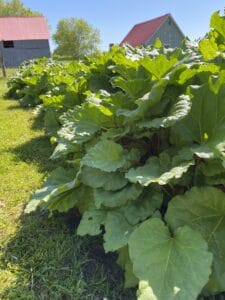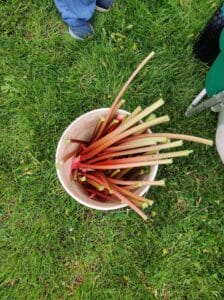The Story Rhubarb Tells
—a root carried, a border crossed, a voice returned—
They called it a vegetable—
by science, by stem,
by how it rose rough through the frost,
stubborn and sour.
But in 1947,
when lines were drawn on ledgers
and tariffs marked in ink,
the United States chose otherwise.
Rhubarb, they said, was a fruit—
not for what it was,
but for what it meant.
It came stewed, sweetened, wrapped in pastry.
It came in crates from Canada—
and so,
to ease its entry,
they gave it the softer name.
That’s how borders work sometimes.
They bend—for flavour. For need.
But the deeper truth of rhubarb
was never written in trade law.
That truth had found its home quietly thirty years earlier
in a field
outside Cobden, Ontario,
in the hands of a mother
who had to watch two sons go off to that war that was supposed to end all wars.
When only one came home in 1918.
The one who returned
had brought with him a root—
maybe dug from near the trenches,
maybe wrapped in cloth,
and maybe held close that rhubarb root
on the ship back to Canada.
He planted it in the garden,
by the same fence they likely once leaned on
before the world broke open.
And it grew. And it bore fruit.
Year after year,
it returned—
without being asked,
without being spoken to—
like memory,
like grief that blooms.
Now, over a century later,
as spring begins, a brand new plant sprouts from that old French root.
and finds its way to a family
maybe at the local military base, maybe to a farm, and maybe to one in town and in the country.
They plant it in new soil.
They watch it take hold.
They say it makes the yard feel
like something might stay.
Something that always returns.
Sorrow turned sweet.
Sour softened.
A gift passed down
without need for explanation.
Because rhubarb makes for memory.
Even when the world forgets.
Even when the ship sails.
Even when only one comes back.
It roots itself quietly—
in what we carry,
and in what we share.
So here’s to rhubarb.
To what it survives.
To what it gives.
To the stories that grow back
year after year,
whether anyone is ready or not.
And if you listen—
if you truly listen—
you’ll hear it say:
Let me tell you what comes next.
That’s the question we asked.
And that question was answered—
with poems, haiku, sonnets, and reflections.
 What does a tariff ruling in 1947, the first World War, and a poetry project have to do with rhubarb? It’s poetic in fact. Every year for the past three years, The Merry Dairy has started the rhubarb exchange with a bunch from the Cobden Patch.
What does a tariff ruling in 1947, the first World War, and a poetry project have to do with rhubarb? It’s poetic in fact. Every year for the past three years, The Merry Dairy has started the rhubarb exchange with a bunch from the Cobden Patch.

Leave a Reply